Ukraine Orthodox Update
1 Most important, give to International Orthodox Christian Charities relief for Ukraine: https://iocc.org/blog/ukraine-response-field-update
2 Numerous Orthodox churches have been indiscriminately damaged or destroyed by the Russian military since the beginning of the Ukrainian War. Below is the Church of the Ascension of the Moscow Patriarchate, in Bobryk (Kyiv District).
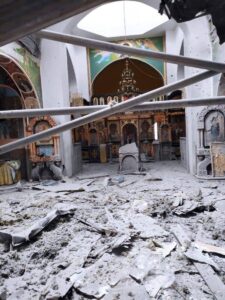
See: https://aleteia.org/2022/03/11/these-churches-in-ukraine-are-in-ruins-as-a-result-of-russian-artillery-fire-and-bombs/
3 I’ve said the current schism in the Orthodox Church is not doctrinal. Am I wrong? Is the heresy of Phyletism involved? Phyletism, as defined at the pan-Orthodox Synod in Constantinople in 1872, is the attempt to limit true Orthodoxy to one national or ethnic group. As I understand it, it can consist of either 1) Negative Phyletism (intentionally restricting a Church institution, for example a parish, to one ethnic group) or 2) Positive Phyletism, which consists of promoting one’s own national or ethnic Orthodoxy as the only true form of Orthodoxy.
Here are two articles on the subject. For easy access to them, go to the bottom of this Post.
This is from “The Moscow Times” regarding the source of the Orthodox schism: https://www.themoscowtimes.com/2022/03/15/orthodox-christian-unity-broken-by-russian-world-heresy-a76922
This is the declaration referred to, which accuses Patriarch Kyrill and the Russian Orthodox Church of Phyletism: “A DECLARATION ON THE ‘RUSSIAN WORLD’ (RUSSKII MIR) TEACHING “: https://publicorthodoxy.org/2022/03/13/a-declaration-on-the-russian-world-russkii-mir-teaching/ As of this posting, it has over 500 signators.
Read these documents and see what you think.
4 Here is a plain-spoken article, “An Orthodox Christian Standing with Ukraine” by Greek Orthodox theologian John Chryssavgis: https://www.themoscowtimes.com/2022/03/01/an-orthodox-christian-standing-with-ukraine-a76685
This also can be accessed at the bottom of this Post.
5 In this Blog I usually try to confine myself to teaching the Orthodox Faith. When I present my opinion, I try to forewarn you. So be forewarned. The following is my opinion:
Many Orthodox theologians and hierarchs have been too cautious (to put it as generously as possible) in their statements about this war. They appear to think they’re dealing only with an ecclesiastical controversy. Or that it’s a political issue. No!
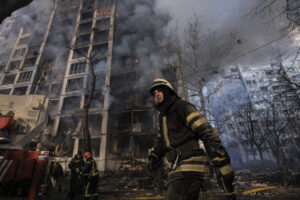
This is a moral issue.The Russian invasion and destruction of Ukraine, with its wanton, intentional, barbaric attacks on innocent civilians, is immoral. Even worse, it consists of one Orthodox country trying to destroy another Orthodox country. Still worse, the war is being conducted at the direction of a man who is a well-known Orthodox Christian. We all know the result when many Roman Catholic bishops did not deal firmly with clergy abuse in their Church. If our Orthodox Patriarchs, Metropolitans and Archbishops do not speak with with one voice, condemning this war and how it is being conducted, they also will lose much of their moral credibility.
5 How to pray for Ukraine?
Many sources report that Ukrainians, both Christian and Jewish, are praying Psalm 31 for sustenance and consolation. So please:
Pray Psalm 31 with the people of Ukraine.
1 In You, O Lord, I put my trust;
Let me never be ashamed;
Deliver me in Your righteousness.
2 Bow down Your ear to me,
Deliver me speedily;
Be my rock of refuge,
A fortress of defense to save me… …to the end.
Second Sunday of Great Lent
The theme of the Sunday Scripture Readings throughout Lent is: Who is Jesus?
In addition, each Lenten Sunday has its own theme. Last week’s was the Sunday of Orthodoxy, and the continuity of Orthodoxy despite all. Others are dedicated to particular saints.
Today:
Saint Gregory Palamas
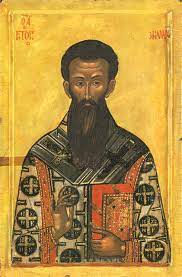 Gregory Palamas teaches us to pray.
Gregory Palamas teaches us to pray.
Palamas was from a prominent family of Constantinople, born about the year 1296. He was bright, and after his parents died the Emperor took him under his wing, hoping he would work in government. However, when he was 20 he went to Mount Athos seeking the life of prayer. Athos at the time was in a decadent period; not a lot of praying going on. But Gregory found a holy elder who taught him the ancient way of Hesychasm. “Hesychasm” comes from the Greek word ἡσυχίαx which literally means “stillness”: a calm quiet heart centered on God.
The way of Hesychasm usually consists of saying the Jesus Prayer over and over: “Lord Jesus Christ, Son of God, have mercy on me, a sinner”- or one can just repeat the name “Jesus”, or “Lord have mercy” or whatever a person finds most helpful. This is what some call a “centering prayer”, a way of keeping mind and heart fixed on God. The usual Orthodox form of quiet meditation to this day is the Jesus Prayer. 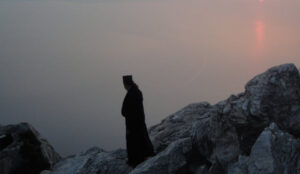 Why is this so? Because Saint Gregory Palamas recovered it for us.
Why is this so? Because Saint Gregory Palamas recovered it for us.
On Athos, Gregory spent weekdays alone and became proficient in prayer. On weekends he came out for Divine Liturgy and taught, gained disciples and became leader of a Hesychast movement. This led to controversy. Those who didn’t pray much didn’t like it.
The Hesychasts believed the foundation of the Faith is the experience of God, known by prayer and worship. This is classic Orthodox teaching. However, some Orthodox philosophers of that time had been influenced by Roman Catholicism, which said the Faith is grounded in intellect, understanding, doctrine.
This is the usual Western Christian approach to this day. What holds Roman Catholicism together is Papal authority, doctrine defined by the Magisterium. In a similar way Protestants base their Faith on doctrine found in the Bible – though they’ve disagreed on what the Bible actually teaches.
The foundation of Orthodoxy is the experience of the presence of the living God in worship, in prayer, in the sacraments, in the community, written on our hearts. That’s what holds us together.
It’s important to note that Orthodox also have a lot of doctrines, and that Roman Catholics and Protestants also do a lot of praying. Our disagreement is about what deep down is the foundation of the Faith. And that was the issue at Gregory Palamas’ time.
Then it got all caught up in the politics of the day. The Byzantine Emperor needed Western military help against the Turks, and he didn’t want any arguments with the Pope. Finally, believe it or not, Gregory wound up in jail! But his teaching was soon vindicated at a series of Councils in Constantinople. In the process, some Metropolitans were deposed, and Gregory was made Archbishop of Thessaloniki. I would guess this was the very last thing he wanted. H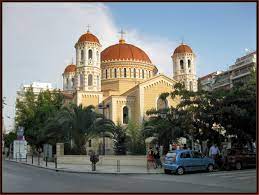 e might have preferred jail where he could pray.
e might have preferred jail where he could pray.
Metropolitan Cathedral of Saint Gregory Palamas, Thessaloniki (greece.com)
No matter, he accepted becoming Archbishop. At first the people in Thessaloniki did not accept him. Then, just as he had got settled into the job, on a voyage to Constantinople his ship was captured by Turkish pirates who put him in jail (second time around!) for a year. Finally he returned to Thessaloniki where he served well in peace for the last three years of his life, in peace.
The night before he died Saint John Chrysostom appeared to him and said: “Now Gregory, to the heights! to the heights!”.
Saint Gregory Palamas died in 1358 and was declared a saint by the Patriarch of Constantinople only ten years later, in 1368.
Gregory estabished himself in Hesychasm, the prayer of silence, on Mount Athos. He continued that life of interior silence all the rest of his life – through 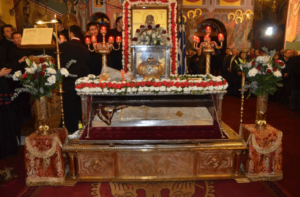 controversy, through imprisonment, through rejection, through a very active life as a Heirarch, and peacefully into death.
controversy, through imprisonment, through rejection, through a very active life as a Heirarch, and peacefully into death.
I had the privilege of praying before his relics in Thessaloniki.
![]()
The Lenten message of Saint Gregory Palamas for us is “Pray. Pray. Pray.” Try to establish your inner life in the peace of God. Then that prayer, that stillness” can carry you through every circumstance of life. However you do it, walk in God’s presence, walk with God.
So now, brothers and sisters: To the heights! to the heights! Pray!
Epistle for the Second Sunday in Lent: Hebrews 1:10-14,2:1-3
As you heard last week, most of our Lenten Sunday readings were originally intended to instruct catechumens who were about to be baptized on Pascha, as to the most important question: Who is Jesus of Nazareth? Last Sunday’s Gospel told them that He is Messiah, Son of God, Jacob’s ladder uniting heaven and earth, and Son of Man, fully human, and the Messiah whose Kingdom will never end.
This Sunday’s Epistle quotes some Old Testament passages which were believed to refer to the Messiah. Remember that after His resurrection Christ showed his disciples the places in the Law and the Prophets “referring to Himself”. Omitted in today’s reading is the quote earlier in this passage from Psalm 2, where God says to “someone”: “You are my Son. Today I have begotten You.” That Someone, says Hebrews, is Jesus of Nazareth, the Son of God.
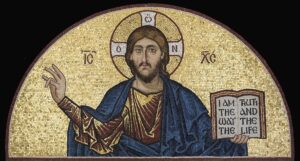
In this Sunday’s Epistle we hear the quote from Psalm 101 (102 in Protestant Bibles and The Orthodox Study Bible). I read that, in the Greek declension, this also is God speaking to someone else: “In the beginning, You, Lord,…laid the foundations of the earth, the heavens are the works of his hands. They will perish, but He will remain, they will all grow old, like a mantle He will roll them up and they will be changed. But He is forever the same, his years will never end.” This is God addressing Jesus Christ, His only begotten Son.
Listen catechumens: We Christians believe this “impossible” thing. This Man Jesus of Nazareth is eternal. He is the only-begotten Son of God.
Gospel for the Second Sunday of Lent: Mark 2:1-12
Who is Jesus? He is the One who has authority to forgive sins.
Jesus had made His home base for ministry in Capernaum on the shore of the Sea of Galilee. After one of His travels, teaching and healing, He was back home. Some men brought a paralyzed man on a pallet (a straw bed), hoping Christ would heal him. But great crowds had gathered, and they couldn’t get near him. So his friends had an idea: They took the paralytic up on the roof * and let the paralyzed man down on the pallet, right in front of Jesus. Clever!
- Explanation: In that warm climate, roofs had large holes in them covered with canvass, which could be opened for ventilation.
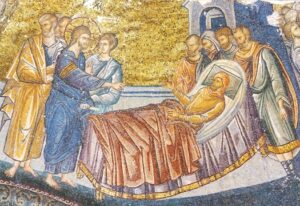 With permission of Saint Isaac’s Skete at skete.com
With permission of Saint Isaac’s Skete at skete.com
Jesus said to him: “My Son, your sins are forgiven.” It doesn’t explain why He said that. Was there some connection between the man’s inner state and his outward paralysis? (I’ve heard of such cases.) No matter, some scribes standing there were thinking in their hearts “Who can forgive sins, but God alone?”
Good question. While hearing Confessions an Orthodox priest says to the penitent: “I, humble and a sinner, have no power on earth to forgive sin, but God alone.”
Jesus, perceiving what was in their hearts, said: “Which is easier to say: Your sins are forgiven? or Stand up and walk? But to prove that the Son of Man [that Messianic title again] has power to forgive sins, He turned to the paralytic and said: ‘Take up your pallet and go home'”. And the crippled man stood up, took up his pallet and went home! People must have stood there with their mouths hanging open. And then they said: We never saw anything like this!
So who is Jesus? Jesus is the One who knows what is in people’s hearts. John remarked in his Gospel that Jesus “knew what was in men”. Jesus is the One who has authority to forgive sins – for, as the scribes said. Who but God can forgive sins? And, as the people said, Indeed, there has never been anything like this. There has never been anyone like this on the face of the earth – God in flesh come from heaven to save us.
So, returning to the conclusion of the Epistle:
If the Jews got into trouble for neglecting God’s Law revealed by the angels – it was common belief that the Old Testament Law had been revealed to Mose by angels – “how should we escape if we neglect such a great salvation” as this?
For Christianity is not a manmade philosophy. It is not some human theory. It is more even than a supernatural revelation of truth. This is the revelation of God Himself by God Himself – declared to us by the Lord with many witnesses, the Apostles who walked with Him and knew Him and heard Him.
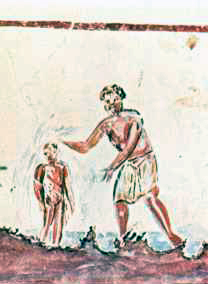 from Catacombs of San Callisto, Third Century
from Catacombs of San Callisto, Third Century
Catechumens: If you do not believe this, if you do not plan to take this seriously and follow Him as Lord and God all the rest of your life, then, Stop now! Do not be baptized! Do not play games with Christ our God who sees within you. The Living Fire will burn you.
But if you believe this, believe in Him and will try to follow Him, then be baptized and join us, and walk with us into the Resurrection.
Next Week: Third Sunday of Lent – Sunday of the Holy Cross: What will it cost us to follow Christ?
Week after Next: Fourth Sunday of Lent – Saint John Climacus: Climbing the Ladder

Thank you, Fr. Bill, for the links you’ve posted regarding opposition to Patriarch Kryill. Putin’s war is shameful, as is the support the war receives from certain segments of the church.